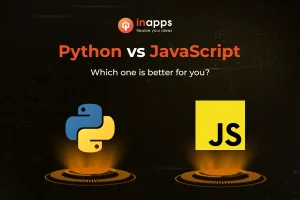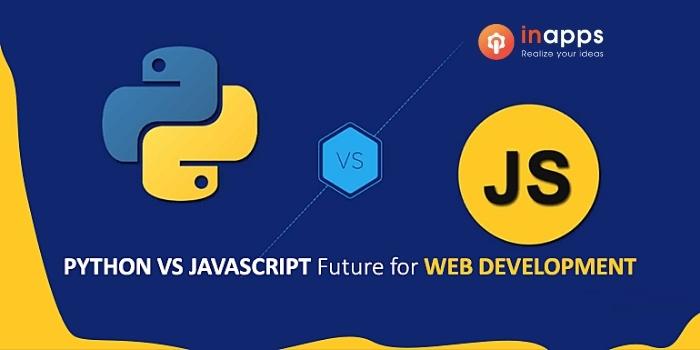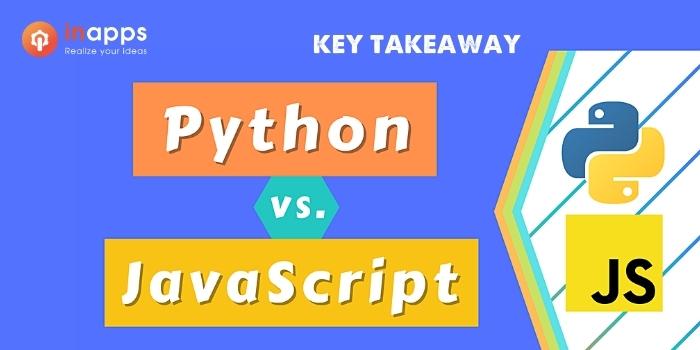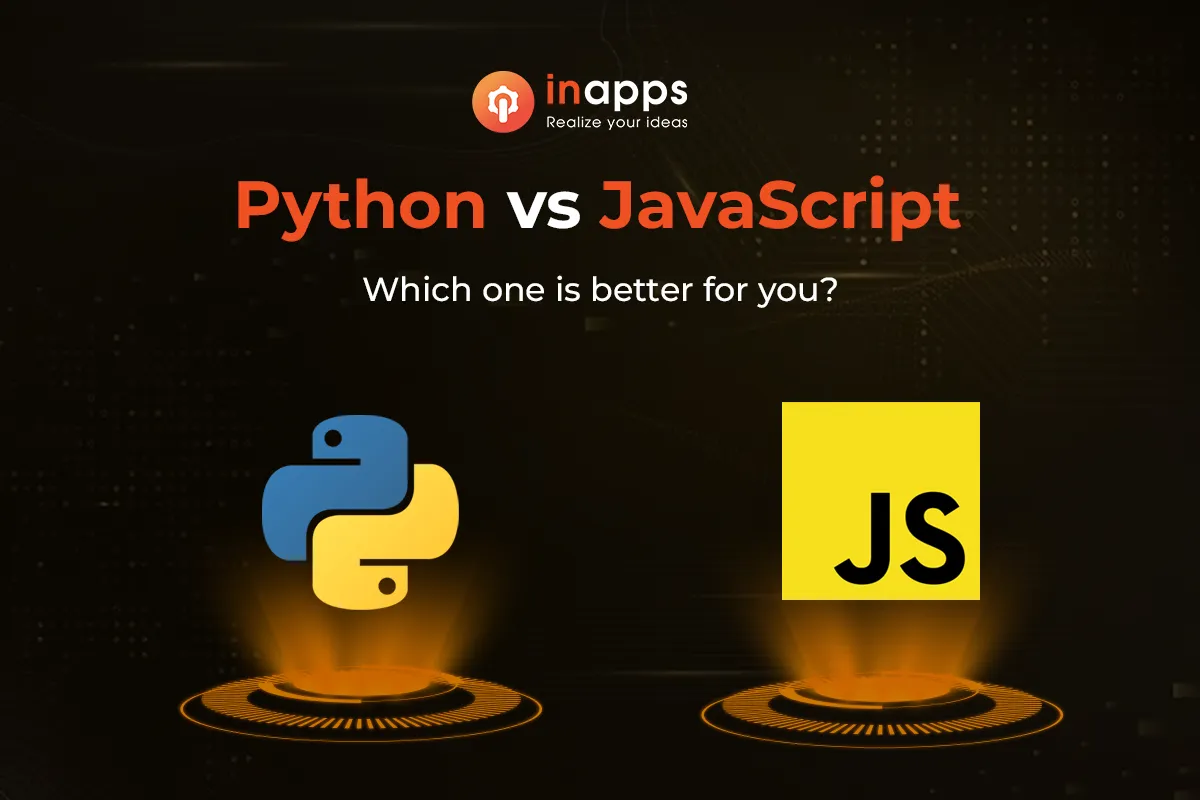What is the difference between Python and Javascript? When talking about Python vs Javascript, both of them are pretty popular languages and have come in handy in many situations. There are a lot of similarities between Python and JS. Both are object-oriented programming languages. However, they are distinct with some major variations.
From an education perspective, when talking about just beginning to learn, Python remains to be an easier choice somehow. In reality, being simple and easy to understand is one of the key design goals of the Python programming language. In this blog, we will carry out a thorough comparison between both of these languages and help you understand the key differences between them.

What is Python?
Python comes with dynamic semantics and is popularly known to be an interpreted, object-oriented, high-level programming language. The easy and simple learning of the syntax of Python emphasizes readability and thus lowers the cost of maintenance of the program. Modules and packages are provided by Python, which facilitates program modularity and code reuse.
Uses of Python
- It can be used on a server for building web apps.
- To build workflows, Python can be used with the software.
- Python will link to the systems of a database. It can read and edit files as well.
- It can be used to manage big data and perform complex mathematics.
- It is used for rapid prototyping or production-ready software creation.
Features of Python
- It is a high-level programming language and easy to code.
- It is an object-oriented, free, and open-source language.
- Python is an Extensible language.
- It has a big standard library that offers a rich set of modules and functions.
- Python is a dynamically typed language.
What is Javascript?
It is versatile and most typically used as part of online pages whose implementations enable the user to communicate with the client-side script and build interactive pages. It is an interpreted programming language with object-oriented features.
JavaScript was formerly known as LiveScript, but, probably because of the popularity induced by Java, Netscape decided to name it JavaScript. JavaScript appeared for the first time with the name LiveScript in Netscape 2.0 in 1995.

Uses of Javascript
- It is used for creating robust web applications and web pages.
- React Native is a popularly used JavaScript framework for developing mobile applications.
- It offers several libraries and frameworks for making a game.
- You can add interactive behavior to web pages.
- It helps to build web servers and develop server applications.
Features of Javascript
- It is an object-based scripting language.
- It offers the user more control over the browser.
- It is a client-side as well as a server-side language.
- Javascript fully supports DOM manipulation.
- It offers web pages with interactive elements that engage a user.
The difference between Python and Javascript – all factors
These two languages are very prominent and efficient, but they have important distinctions that make them stand apart from the crowd and each other. Let’s have a look at these differences so that we can interpret and better make a decision about which language to go for.
REPL
You have access to REPL with the installation of Python on your system. With JavaScript, however, no in-built REPL is available. It is because JS runs within a browser for the most part. Nevertheless, by downloading Node.js, you can have REPL for JavaScript.
Procedural Programming
Python and JavaScript have adopted a multi-paradigm methodology, i.e., they encourage more than one paradigm of programming. Both Python and JavaScript provide programming methods that are functional, imperative, and object-oriented. Python, nevertheless, has many aspects of a language for procedural programming, while JavaScript does not.
Mutability
Data types are split into mutable and immutable types in Python. The set is, for instance, a mutable data type, while the list is an immutable data type. Mutable objects can be described as those whose values can be adjusted once values have been assigned to them. Immutable objects, by contrast, can’t alter values. JavaScript has no definition of mutability, unlike the Python programming language.
Performance
JavaScript is the definite winner when analyzing the performance component of Python vs Javascript. It will take more time for software running on Python to act, rendering it inactive for the user community. Thus, you must use JavaScript if you are focused on developing websites that perform effectively.
Javascript vs Python Speed
When comparing Python vs. JavaScript, scalability is a significant factor. It contributes to the strengths of languages when it comes down to managing a massive amount of users and storing vast volumes of data while using limited server use.
One of Node.js’ aims is that it has been built to be scalable and promotes asynchronous programming. Node.js is thus far more suited for the development of programs that rely on the speed of execution.
Numeric Types
You only have floating-point variables in JavaScript. On the other hand, there are many varieties of numeric data types in the Python programming language, such as int, fixed-point decimal, and float.
Object Access
Python has a self-argument for each process as the first argument. In comparison, JavaScript has the ‘this’ method for accessing an object.
Machine Learning
Python is the principal preferred language for ML programmers. It makes a great deal of sense. Machine learning is complex and requires vast quantities of data. Python is a basic and understandable language, so, eliminating ambiguity, makes life simpler for programmers, and it’s always been the data science standard.
TensorFlow, sci-kit-learn, and PyTorch are some of the most common ML frameworks that are mostly built on Python and offer dedicated Python APIs that are the most popular way to use them. A JS version of the framework was released by TensorFlow in 2018, enabling programmers to develop machine learning models that operate in the browser or on a Node.js server.
But to triumph over the ML community isn’t enough. Python is well equipped for machine learning, and in the coming years, it is impossible to be superseded by another language.
What’s in the future for Python and Javascript?
Almost everything we addressed in this post supports the notion that it’s not fair to compare Python and JavaScript. These languages were developed with various purposes in mind, leading to variations in how they are used in software development.
And it’s precisely those distinctions that enable these technologies in the digital age of programming to complement each other seamlessly.
So, now what will the future look like? At present, the role of JavaScript as the most effective toolset for web and mobile application development seems quite solid. It is being converted into a general programming language more and more, but it is uncertain if that would be a suitable replacement for a language like Python.
As for Python, due to its readability and ease of use, as well as its capacity to manipulate data, it will most likely completely dominate the machine learning industry, as well as the education sector.
To sum up, the selection of your tech stack will depend on the essence of your task, the availability of developers, and many other variables.

Is Javascript or Python better?
The right option to select if you are getting into web development is the famous trio of HTML, CSS, and JavaScript. However, individuals who want to learn or work on machine learning, data science, and neural networks should go for Python. So, naturally, choosing between the two is not just about which language is performing better in the market. It is mostly about your purpose and which language can serve that particular purpose.
Wrapping Up: The difference between Python and Javascript
With Python, you can accomplish almost everything that you can do with JavaScript. Both programming languages share several elements, including being lexically scoped and adopting a multi-paradigm methodology. At the very same time, some distinctions must not be overlooked between the two.
Python and JavaScript have no scarcity of libraries and extensions available to achieve more than what is provided as built-in features. Python has a greater market reach and is also easy to understand, even though both have many work opportunities available.
In addition, your perspectives and interests contribute to the conclusion of the Python vs. JavaScript discussion. For example, because of its simple syntax, learners might go for Python. Start preparing for Python interviews if you are planning a career in Python or want to land your dream job.
Do you own a business and looking to hire Python or Javascript professionals but are lost or confused about how to move further? We have got you covered. Go to InApps and get your problems solved in a jiffy.

While many people say that Python is easier to comprehend than JavaScript, for individuals with a programming background, that’s not accurate. JS fundamentals can be mastered in just a few months, and with a year of commitment, a person with their abilities can start earning pretty good money.
You must begin with JavaScript before Python, Ruby, PHP, or other similar languages if you intend to learn your first programming language after dealing with the basics of HTML and CSS.
Basically, yeah, you can land a job if you know JS and whatever framework the organization you are applying for uses, but if it’s your first job, for the first 3-6 months or so, they may expect to give you a reasonable amount of hands-on training.
Python can be used for either front-end or back-end development. That being said, its accessible syntax and popular server-side use allow Python to be a key back-end development programming language.
FAQs: The difference between Python and Javascript
Is JavaScript faster than Python? Is Python faster than javascript?
Python is a lightweight, flexible language that tends to be fast enough for almost anything. While it isn’t built to execute as quickly as possible, it tends to make developers more effective, so projects get done rapidly.
Javascript is one of the fastest dynamic languages in existence, but this wasn’t always the case. Until version 8 was released in 2008, JavaScript was quite slow. That release, however, improved JavaScript’s performance by a factor of 10, making it only 2-7 times slower than the same code written in C++.
It’s pretty hard to provide a general, all-purpose answer to this question. Speed varies tremendously by problem domain, implementation, and code design. Well-written algorithms will almost always outperform poorly-written ones, even when they’re written in ‘faster’ languages.
Is Python or JavaScript easier?
JavaScript is a great, easy, and fast-to-learn programming language.
Python syntax is a delight and is often the ideal beginners-choice for those with no prior programming experience.
No programming language is perfect, but JavaScript is more difficult to master than Python.
Learn more: Go vs Rust – Which is more compatible to use?
Let’s create the next big thing together!
Coming together is a beginning. Keeping together is progress. Working together is success.




















